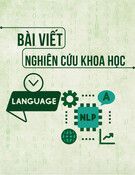
P-ISSN 1859-3585 E-ISSN 2615-9619 https://jst-haui.vn LANGUAGE - CULTURE
Vol. 61 - No. 2 (Feb 2025) HaUI Journal of Science and Technology
91
EXPLORING DAILY DICTATION APP
TO IMPROVE LISTENING SKILLS FOR NON-ENGLISH MAJORS
AT A PRIVATE UNIVERSITY
ỨNG DỤNG DAILY DICTATION ĐỂ CẢI THIỆN KỸ NĂNG NGHE
CHO SINH VIÊN KHÔNG CHUYÊN TIẾNG ANH TẠI MỘT TRƯỜNG ĐẠI HỌC TƯ THỤC
Hoang Ngoc Tue1,
Doan Thi Thu Trang2,*, Le Duc Hanh1
DOI: http://doi.org/10.57001/huih5804.2025.041
ABSTRACT
This study investigates how the Daily Dictation app helps students at a private institution who are non-
English majors improve their English listening
abilities. Although listening is an essential part of learning a language, it is always considered very challenging, particularly for non-
English majors. With regular
practice and instant feedback, the Daily Dictation app offers a useful and approachable way to enhance listening comprehensio
n. This study used a mixed
methods approach, integrating quantitative data from pre-test and post-
test with qualitative feedback collected from student surveys. The findings show that
consistent app use greatly improves student listening skills, increases student confidence, and encourages higher engagement with the course
topics. The results
of the study suggest that using smartphone applications such as Daily Dictation can support students' English listening and i
mprove their English listening skills.
Future research directions and implications for instructional design are also included in the study.
Keywords: Information and Communication Technology (ICT), Daily Dictation, listening skills, technology in education.
TÓM TẮT
Bài báo nghiên cứu về việc sử dụng ứng dụng Daily Dictation vào hỗ trợ học nghe để giúp sinh viên không chuyên tiếng Anh tại một trường tư thục cải thiệ
n
khả năng nghe của họ. Mặc dù nghe là một phần thiết yếu của việc học ngôn ngữ nhưng người học tiếng Anh lại gặp rất nhiều khó khăn trong việc nghe, đặ
c
biệt là đối với sinh viên học các ngành kỹ thuật và xã hội. Với việc luyện nghe thường xuyên và phản hồi tức thì, ứng dụng Daily Dictation cung cấp một cách hữ
u
ích và dễ tiếp cận để nâng cao khả năng nghe hiểu. Nghiên cứu sử dụng phương pháp tiếp cận hỗn hợp, tích hợp dữ liệu định lượng từ kiểm tra trướ
c và sau khi
tiến vào thực nghiệm và phản hồi định tính thu thập được thông qua khảo sát bảng hỏi và điểm số từ các bài kiểm tra trước và sau khi sử dụng ứng dụng củ
a sinh
viên. Thông qua số liệu khảo sát cho thấy việc sử dụng ứng dụng Daily Dictation cải thiện đáng kể về kỹ năng nghe của người học, tăng sự tự tin củ
a sinh viên và
giúp cho sinh viên thích nghe tiếng Anh hơn, nhất là các chủ đề của khóa học mà ứng dụng cung cấp. Những kết quả này cho thấy rằng việc kết hợp các ứng dụ
ng
điện thoại thông minh như Daily Dictation vào các chương trình học ngôn ngữ có thể giúp sinh viên không chuyên cải thiện khả năng nghe của họ. Các hướ
ng
nghiên cứu trong tương lai và ý nghĩa đối với thiết kế hướng dẫn cũng được đưa vào để tiếp tục nghiên cứu.
Từ khóa: Công nghệ thông tin và truyền thông (ICT), Daily Dictation, kỹ năng nghe, công nghệ trong giáo dục.
¹School of Languages and Tourism, Hanoi University of Industry, Vietnam
²Hanoi Financial and Banking University, Vietnam
*Email: Doanthithutrang@fbu.edu.vn
Received: 02/11/2024
Revised: 20/01/2025
Accepted: 27/02/2025
1. INTRODUCTION
Learning English involves practising listening,
speaking, reading, and writing skills, as well as
understanding grammar, vocabulary, and cultural
nuances [1]. Modern technology has greatly improved
this process through interactive and flexible tools such as

VĂN HÓA https://jst-haui.vn
Tạp chí Khoa học và Công nghệ Trường Đại học Công nghiệp Hà Nội Tập 61 - Số 2 (02/2025)
92
NGÔN NG
Ữ
P
-
ISSN 1859
-
3585
E
-
ISSN 2615
-
961
9
Duolingo, Memrise, and Rosetta Stone, which provide
personalized learning experiences. Platforms such as
Zoom, Grammarly, and AI-powered assessment systems
help improve skills and provide rapid feedback.
Appropriate teaching strategies and technology
integration can help address these issues by providing
learners with real-time practice opportunities and
interactive exercises designed to improve specific skills
[2]. In the context of higher education in the 4.0 era,
technology helps address these issues through
interactive practice exercises and adaptive learning
systems. Applications such as Daily Dictation, Elsa, etc.
help improve listening skills, provide a variety of materials
and instant feedback, and help learners identify errors
and gradually improve their skills.
Although Daily Dictation is free to use, it is not popular
with non-English majors. Furthermore, specific studies on
the Daily Dictation application in improving English
listening skills have not been widely published, and there
are also few studies on the extent to which this website
improves English listening comprehension. Therefore,
this study was conducted to investigate the students’
perspectives towards the Daily Dictation application and
its effectiveness in improving the listening skills learning
of non-English majors at a private university in Vietnam.
To address this objective, the two following research
questions were formulated for the study:
(1) What are the perspectives of the non-English majors
towards applying Daily Dictation in their English listening
skills?
(2) What effects does the Daily Dictation application
have on improving the listening skills of non-English majors
at a private university?
2. LITERATURE REVIEW
2.1. English listening skill
Language learning is the process of acquiring and
developing the skills needed to use a language other
than one’s mother tongue by Oliveros Cortez [3]. The
benefits of language learning are diverse, including
expanded career opportunities, enhanced cognitive and
creative abilities, and stronger cross-cultural
relationships. In an increasingly globalized world, the
ability to speak multiple languages is an important and
valuable skill. According to Richards et al. [1], English
language learning is the process by which learners
develop the ability to understand, speak, read, and write
English. This process typically involves expanding
vocabulary, mastering grammar, improving
pronunciation, and improving listening comprehension.
More than one billion people speak English globally, both
native and non-native, and it is the official or default
language in many countries [1].
Learning a language in general or English in particular
involves four basic skills: listening, speaking, reading, and
writing. These skills are closely related to each other and
together help improve overall language proficiency.
According to many studies, listening skills are considered
the most important of the four skills. When we first start
learning a language, we all start by listening, listening
repeatedly, repeating, writing, etc. This is the basis for
effective communication; understanding the messages
of others helps learners feel more confident in
responding and participating in conversations. In
everyday communication, listening comprehension tasks
take up more time - about 45% - than speaking, reading,
and writing tasks. Listening is an early stage of natural
speech (spoken) and is acquired in the early stages of
language by Nation and Newton [4]. In other words,
listening and hearing differ, as listening involves actively
processing speech received through the ear. The follow
Brown [5] theorizes these types of listening as follows: (1)
Intensive: listening to recognize components (phonemes,
words, intonation, aphorisms, etc.) of a wider range of
language; (2) Rapid Response: Listening to a relatively
short piece of language (greetings, questions,
commands, comprehension checks, etc.) to give an
equivalent short response; (3) Selective: Processing text
passages into short monologues for a few minutes to
"scan" certain information.
English listening skills include many important
elements that help learners understand and receive
information effectively. According to Brown [5], sound
discrimination is the first element, requiring listeners to
recognize the difference between tones, stresses, and
accents from different regions. Next, vocabulary
recognition and understanding the meaning of words in
context are important, as the semantics of vocabulary can
change depending on the situation and the speaker's
emotions.
In the context of teaching English listening skills in
Vietnam, learners encounter several significant
challenges that can hinder their acquisition of effective
communication abilities. One prominent obstacle is the
overwhelming exposure to diverse accents and rapid
speech, which can lead to comprehension difficulties.

P-ISSN 1859-3585 E-ISSN 2615-9619 https://jst-haui.vn LANGUAGE - CULTURE
Vol. 61 - No. 2 (Feb 2025) HaUI Journal of Science and Technology
93
Additionally, cultural nuances and idiomatic expressions
often pose barriers, as students may struggle to connect
contextual meanings with their native language
frameworks. These issues are compounded by traditional
teaching methodologies that prioritize rote
memorization over interactive engagement, thereby
limiting students' practical listening experiences.
Furthermore, as highlighted in recent discussions
surrounding English language teaching, the integration
of new technologies and learning environments
necessitates a reevaluation of teaching approaches to
effectively foster learner autonomy while providing
necessary support [3, 4]. Addressing these challenges is
crucial for enhancing the overall effectiveness of English
language instruction in Vietnam.
2.2. Technology in learning English
According to Pratt [6], Information and
Communication Technology (ICT) encompasses the
infrastructure and components that enable modern
computing. This includes devices, applications, systems,
and technologies that facilitate interaction and
connectivity in the digital world. ICT plays a crucial role in
enhancing business operations and economic growth
and facilitating modern communication and information
exchange. Furthermore, educators and students express
positive views because they have the opportunity to use
virtual training tools, which facilitate the mobilization of
the teaching-learning process by Hernández et al. [7]. ICT
plays an important role in the modern education system
because of its ability to provide dynamic and interactive
learning environments. ICT enables anytime, anywhere
access to learning resources via the Internet and provides
teachers and students with tools to enhance educational
quality. Pratt [6] emphasizes that Information and
Communication Technology has become essential in
education, transforming the way knowledge is acquired
and acquired in unprecedented ways. ICT in education
has been shown to have a positive impact on learning
outcomes by promoting active engagement, facilitating
personalized learning pathways, and providing access to
a wide range of educational resources beyond the
traditional classroom [8, 9]. In terms of learning
experiences, learners will have experiences ranging from
basic to advanced learning. Users will have more access
to learning support tools, providing interactive and
multimedia content to engage students more effectively
than traditional teaching methods [9]. When applying ICT
in education, schools as well as students will be more
convenient in uploading and learning about online
educational resources such as e-books, videos,
simulations, etc. labs, virtual practice, research articles,
magazines, etc. There are many different resources
everywhere and there are even documents from a long
time ago that can still be searched. Graddol [10] stated
that “technology lies at the heart of the globalization
process, affecting work, education and culture”.
Modern technology has brought many useful
applications to help improve listening skills. Applications
include Podcast, Duolingo, Elsa Speak, Cake, Youtube,
TED, etc. Each tool has its unique features and limitations
[8-10].
The integration of technology in learning English has
proven to offer significant benefits, particularly in
enhancing language skills among students. In Vietnam,
the shift towards blended learning, accelerated by the
COVID-19 pandemic, has allowed for flexible educational
methods that combine traditional face-to-face
instruction with digital resources. As highlighted by
recent studies, this approach has been well-received by
English-majored students, who recognize its potential to
improve their language competencies while also
presenting certain challenges [11]. Furthermore, the
increasing emphasis on technology in educational
practices aligns with a broader trend of improving
research and pedagogical effectiveness in Vietnamese
universities, responding to the demands of globalization
and the digital age [12]. Consequently, the adoption of
innovative language learning tools strengthens students'
engagement and fosters a more interactive and inclusive
learning environment, ultimately leading to higher
proficiency in English.
The incorporation of technology into English learning
in Vietnam brings promising opportunities for greater
engagement and resource access, but it also introduces
notable challenges and limitations. A major concern is
unequal access to technology, as numerous students in
rural regions struggle with unreliable internet
connections and lack the required devices, which restricts
their full participation in online learning platforms.
Moreover, the effectiveness of these online resources is
frequently compromised due to insufficient technical
training for both teachers and students, limiting their
capacity to effectively navigate and use these tools.
Additionally, technology usage can promote a
dependence on surface-level learning methods, which
may detract from crucial communication skills. As

VĂN HÓA https://jst-haui.vn
Tạp chí Khoa học và Công nghệ Trường Đại học Công nghiệp Hà Nội Tập 61 - Số 2 (02/2025)
94
NGÔN NG
Ữ
P
-
ISSN 1859
-
3585
E
-
ISSN 2615
-
961
9
highlighted in the literature, addressing these obstacles
is essential to maximizing the benefits of technology in
the English language training market (ELTM) for a wider
array of learners [12, 13].
Despite being free to use, Daily Dictation is not well-
liked by students who do not major in English.
Additionally, there are a few published studies specifically
examining the Daily Dictation app's ability to enhance
English listening comprehension, and even fewer
examining how much this website enhances listening
comprehension. Thus, this study was carried out at a
private institution in Vietnam to find out how the
students felt about the Daily Dictation program and how
well it worked to help non-English majors acquire
listening skills.
3. METHODOLOGY
This study uses a quasi-experimental research design
to investigate the impact of applying the Daily Dictation
tool and supporting listening skills learning for non-
English majors. According to Cook and Campbell [14],
two pioneers in the field, quasi-experimental research
can be defined as follows: A quasi-experimental research
design is one in which the conditions are controlled. The
study was controlled, but there was no randomization of
subjects into groups. This reduces the reliability of the
results but creates a more realistic context for applying
the research results to practice.
The researchers selected two classes of non-major
students at a private university in Vietnam as the
experimental and control groups. They were first-year
students majoring in Accounting and Finance. The
experimental group had 48 students, and the control
group had 55 students; all of them were at level A1
according to the 6-level foreign language proficiency
framework for Vietnam. The experimental group was
taught according to the method and curriculum required
by the university but also was guided to use the Daily
Dictation tool to help them learn better listening skills,
while the control group followed the same method. Both
groups were given a pretest in the first lesson and a post-
test in the last lesson.
Students in the experimental group used the Daily
Dictation application continuously for 2 months of
research. Each student in the experimental group, in
addition to studying according to the school's program,
also was taught the Daily Dictation application through
one activity in each lesson in the class. Each day, students
practised listening to the application for at least 30
minutes on different topics and ticked a checklist of their
application. After each week, students tested the process
of performing listening activities on the student
application. After the post-test, an online survey was
delivered to all the students in the experimental group
via Google Forms in two weeks. The results of the pretest
and post-tests were compared to see if there were any
differences, thereby concluding the effectiveness of
using Daily Dictation and supporting students in learning
listening skills. In addition, the data from the online
survey was collected and analyzed descriptively to figure
out the significant findings of the research.
In this study, Daily Dictation was applied to support
students’ listening skills (Fig. 1). Daily Dictation is a
popular online learning tool that provides English
listening exercises for learners of all levels. As shown in
Fig. 2, this tool helps improve listening skills through 4
steps: (1) Listen to audio repeatedly to improve listening
ability; (2) Write down what is heard to increase attention
to detail and improve pronunciation, spelling and
writing; (3) Check and correct errors to improve
comprehension and reading accuracy, and relearn
mistakes made; (4) Read aloud what you have written to
improve pronunciation and speaking skills.
Fig. 1. Daily Dictation's Homepage Interface
Fig. 2. Steps when implementing a lesson in Daily Dictation
4. RESULTS AND DISCUSSION
The data gathered from surveys and semi-interviews
were analyzed in detail and can be categorized into three

P-ISSN 1859-3585 E-ISSN 2615-9619 https://jst-haui.vn LANGUAGE - CULTURE
Vol. 61 - No. 2 (Feb 2025) HaUI Journal of Science and Technology
95
main sub-themes: students' motivation to learn listening,
the advantages of using the tool, and the challenges
faced by students.
All participants were at the A1 proficiency level, as per
the CEFR, but there was a noticeable variation in their
English proficiency. As indicated in Fig. 3, the survey
revealed that most students (80.6%) expressed a positive
attitude towards learning listening skills, recognizing
their importance in language learning. However, 16.5% of
students showed disinterest, possibly due to challenges
in improving their skills or dissatisfaction with the
learning process.
Fig. 3. The level of interest in learning listening skills of student
This finding is comparable to Silviyanti's [15]
investigation into how students perceive the Technology
app in listening skills, which revealed that students
showed their interest in the technological application
and they believe engaging content improves their
listening focus.
The students' motivations for learning listening were
primarily focused on improving communication skills
(56.3%), followed by enhancing listening comprehension
(27.2%) and professional needs (9.7%). A few students
(3.9%) were motivated by personal interests, such as
watching movies, and some (2.9%) planned to study
abroad (Fig. 4).
Fig. 4. Students' motivation in learning listening skills
These results highlight how important dictation is as a
useful tool for improving listening comprehension. EFL
students may gain from a more convenient and
interesting learning environment and improve learning
results by fusing cutting-edge technology with
conventional dictation techniques.
Motivation is the essential key element in learning in
general and in learning a language in particular. The
results are similar to Sharma et al.’s [16] study, which
applied YouTube to improve listening skills, and Yaacob
et al. [17], which found significantly positive engagement
with interactive video applications in students’ listening
skills. These findings revealed that any technological
applications would be very motivating and supportive for
students in practising and enhancing their listening skills.
In terms of comprehension, 60.2% of students
reported understanding only 10 - 30% of conversations,
indicating significant difficulties, mainly due to
vocabulary gaps, unfamiliar pronunciations, or fast
speaking speeds at the beginning of the research (Fig. 5).
Fig. 5. Students self-assess their English ability
Additionally, 55.9% of students used digital tools like
Daily Dictation to improve their listening skills, with 25%
of students familiar with this application. Other platforms,
such as podcasts and audiobooks, were also used by
students to support their learning.
During the two-month study period, the survey results
revealed that all participants made progress in their
English listening skills. After using Daily Dictation, the
majority of students reported a positive increase in
motivation. Specifically as shown in Fig. 6, 30.4% felt
"Highly motivated," and 41.7% felt "motivated," showing
that the application had a significant impact on their
learning. However, a small number of students (10.9%)
felt neutral, and 19.5% reported feeling less motivated.
The overall feedback from participants was positive, with
most learners finding the tool motivating in improving
their listening skills. This finding is similar to Alegre [18]
and Francis [19] in the increase in students’ engagement






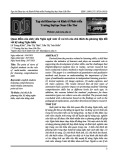
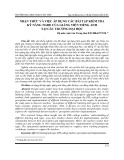
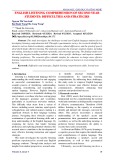

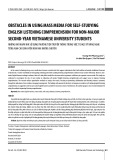


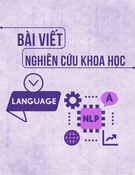
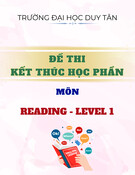
![Đề cương môn Tiếng Anh 1 [Chuẩn Nhất/Mới Nhất]](https://cdn.tailieu.vn/images/document/thumbnail/2025/20251130/cubabep141@gmail.com/135x160/51711764555685.jpg)







![Mẫu thư Tiếng Anh: Tài liệu [Mô tả chi tiết hơn về loại tài liệu hoặc mục đích sử dụng]](https://cdn.tailieu.vn/images/document/thumbnail/2025/20250814/vinhsannguyenphuc@gmail.com/135x160/71321755225259.jpg)
